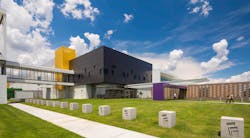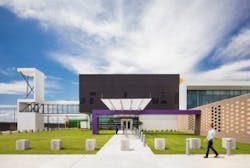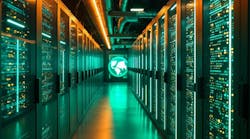8 Reasons Why Dallas-Fort Worth is a Rising Destination Data Center Market
There are only a few real destination data center markets in the world. Dallas-Fort Worth has earned that status for several reasons. Rodney Willis, RagingWire’s Senior Director of Enterprise Sales, lives and works in Dallas and knows first-hand eight solid reasons why Dallas should be on a data center buyer’s short list.
Rodney Willis, Senior Director of Enterprise Sales, RagingWire Data Centers
With some of the lowest power costs in the U.S., a business-friendly economy, and a favorable climate, the Dallas-Fort Worth Metroplex has established itself as a top tier destination data center market. Dallas is highly appealing for companies looking for data center capacity available today, and for those looking to grow their space in an affordable, business-friendly market.
Many experts with in-depth knowledge of the area are noting Dallas’ rise as a high-tech powerhouse. In Dallas Innovates Real Estate Review magazine, Rick Hughes, the Executive Managing Director of Cushman & Wakefield, said “Data centers need to be near the things they operate (streaming data, phone apps, smart machinery, etc.), and Texas will be the country’s largest mega-region for these things in the next 10 years.”
Here’s a look at eight reasons why Dallas is a smart choice for companies looking to set up, expand or migrate their data centers.
1. Power: Renewable, Reliable and Low-Cost
At around 4.2 cents per kWh, Dallas-Fort Worth offers some of the lowest power rates available, especially compared to markets like New York/New Jersey which is over 13 cents per kWh, or Los Angeles at over 14 cents. Data center customers in DFW can choose from several options for power, which is a great benefit when compared to other locations where only a single provider is available. Another huge advantage is that Texas’s independent power grid, managed by ERCOT (the Electric Reliability Council of Texas), is one of three main power grids that feed the continental United States, providing a strategic option for data center dependability. By maintaining a presence in each of the three grids, companies can make sure that their data centers are as reliable as could be. In addition, renewable energy packages are available upon request in Dallas.
RagingWire’s Dallas TX1 Data Center (image: RagingWire Data Centers)
2. Capacity: Available Now with Room to Grow
For the time being, there is capacity available in Dallas. According to CBRE’s North America Data Center Trends Report for the second half of 2018, Dallas ended the year with 38.6 megawatts of positive net absorption, but still has 65 megawatts of capacity available out of 300 megawatts of inventory. And that doesn’t even count the room RagingWire has to grow at our 42-acre fenced Dallas Data Center Campus, which has space for five interconnected buildings totaling over one million square feet of space. That means great news for data center customers — contracts can be written with flexible terms customized to your needs, with total cost of ownership figures that are lower than ever.
3. Transportation: An Easy Trip to Your Data Center
About half of new Dallas data center buyers come from out of town, and take advantage of the Dallas-Fort Worth International Airport and the Dallas Love Field Airport, which put travelers within a four-hour flight of every major U.S. city. For local DFW businesses, travel is easy to and from your data center, thanks to an extensive highway network which includes the President George Bush Turnpike, the Dallas North Tollway, and the North Central Expressway on Highway 75. While in Dallas, residents really appreciate the city’s vibrant downtown, the popular CityLine campus, the Fort Worth Cultural Arts District, and major pro sports teams.
4. Environment: One of the Safest Data Center Regions
Dallas has a very low risk of dangerous weather conditions. According to data collected from 1950-2010, no earthquakes of 3.5 magnitude or above have occurred in or near Dallas. No hurricanes within 50 miles of Dallas have been recorded either. Houston-based businesses in particular are looking to Dallas for data center space. Why? Houston has suffered three significant floods since 2015, and Dallas is located outside of extreme weather patterns.
5. Incentives: Tax Incentives Available
Texas has been named the best state for business by Chief Executive magazine for 14 years in a row, since the inception of the survey. Certainly tax incentives play a part in that. Customers can save on equipment and electricity taxes for up to 15 years onproperty essential to data center operations, such as exempted computers, electrical equipment, cooling systems, power infrastructure, and software. Texas provides state and use tax exemptions for qualified data center tenants of more than 100,000 square feet that create 20+ permanent jobs, plus other qualifications.
There are a multitude of local, regional, and national fiber providers, as well as direct connections available to local carrier hotels.
6. Economy: Diverse and Thriving
“In the long run, Dallas is primed to be one of the leading cities of North America in the 21st century.” That was the sentiment in a Bisnow article which does a nice job of summarizing all the benefits for businesses in Dallas.The headquarters of 18 Fortune 500 companies are in DFW, including AT&T, Exxon Mobil, Texas Instruments, and American Airlines. Major corporations such as State Farm, Toyota North America, Huawei, Samsung, and McKesson have relocated to the area recently. The area is home to over 100,000 businesses, and a labor force of 3.8 million people.
7. Cloud: Direct Connections to World-Class Providers
DFW data center customers can easily connect to AWS, Azure, Google and more through two major carrier hotels. Approximately 75 network providers operate in North Texas, including more than 40 fiber providers for business services. With this concentration of fiber access and abundant bandwidth, customers can count on low latency and appropriate redundancy.Performance is assured through private network and multiple, configurable bandwidth options.
8. Fiber: Robust Connectivity
Many different telecommunications companies serve the DFW Metroplex. You can take advantage of robust fiber connectivity with lots of freedom to choose a carrier. There are a multitude of local, regional, and national fiber providers, as well as direct connections available to local carrier hotels. You have the option to choose your provider, network access, and performance.
Clearly the Dallas-Fort Worth data center market is a smart choice, whether your business is located within the state of Texas or somewhere else in the country. So if it’s time to sunset your current data center, or you’re looking to expand into a new facility, take a good look at Dallas. You may find the answers there to help your company meet strategic business objectives — all while addressing both your current and future mission-critical IT demands.
Rodney Willis is Senior Director of Enterprise Sales for RagingWire Data Centers.




